1. Russia-Ukraine conflict causes global impacts
The global geopolitical and geo-economic landscape has shifted since Russia launched a special military operation in Ukraine on February 24, 2022. After nearly 10 months of confrontation with no sign of abating, the Russia-Ukraine conflict has caused long-term impacts on international relations and put the world to the verge of dangerous risks in the future.
Vietnam has repeatedly voiced its views on the Russia-Ukraine conflict, calling on all parties to end fighting, resume peace talks, and protect people’s security and safety and local infrastructure.
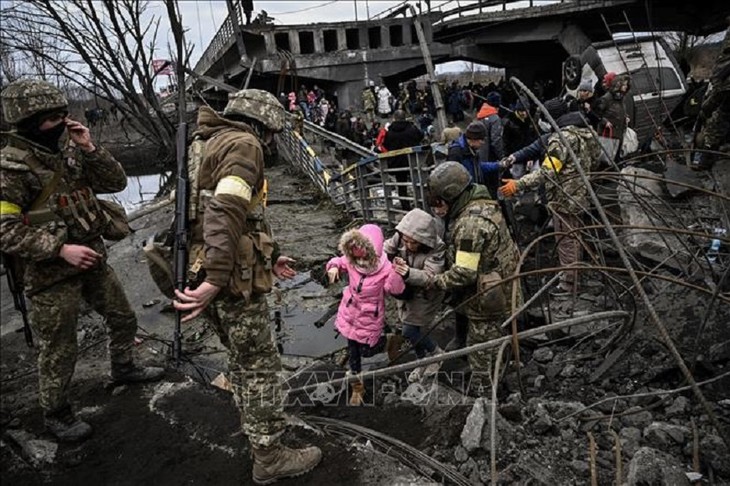 People are evacuated from Irpin city in the northwest of Kyiv, Ukraine on March 5, 2022. (photo: AFP/VNA) People are evacuated from Irpin city in the northwest of Kyiv, Ukraine on March 5, 2022. (photo: AFP/VNA) |
2. World reopens post COVID-19, global economy faces recession
Since March the world had changed its response to the COVID-19 pandemic by proactively adapting to new waves of the epidemic. Most countries have gradually adapted to new normalcy, reopening borders, and restoring trade to regain economic momentum after nearly 2 years of exhaustion due to strict anti-epidemic measures.
But the world’s economic pillars – the US, European countries, and Japan – fell into an unprecedented high rate of inflation, forcing many central banks to tighten spending and monetary policies. Pressure from inflation, food and energy crises, and high interest rates have pushed the world economy to the brink of recession which may continue into 2023.
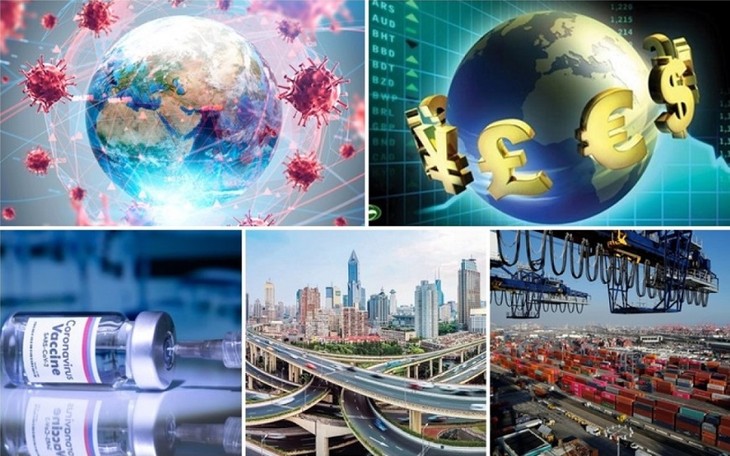 The COVID-19 epidemic has increased pressure on governments. (photo: tapchinganhang.gov.vn) The COVID-19 epidemic has increased pressure on governments. (photo: tapchinganhang.gov.vn) |
3. World population reaches 8 billion people creating new momentum, new challenges
November 15th, 2022 marked a new milestone in mankind's development as the global population reached 8 billion people.
The growth marks advancements in public health care, nutrition, and health care, which will create a huge resource and an abundant labor supply for the world to implement human development goals and socio-economic promotion.
But the population growth poses a lot of challenges which require inter-governmental solutions. The challenges include pressure on infrastructure systems, essential welfare and social services; aging population; growing social injustice, greater gap between the rich and the poor, environmental pollution, and ecosystem degradation.
 World population reached 8 billion people on Nov 15, 2022. (photo: Twitter) World population reached 8 billion people on Nov 15, 2022. (photo: Twitter) |
4. Global energy crisis
The global energy crisis has caused supply shortages in almost all countries, while oil, gas, and electricity prices have risen sharply. There are various reasons behind the energy crisis including the COVID-19 epidemic, climate change, rapid growth in recent years, and consequences of the Russia-Ukraine conflict.
Energy prices skyrocketed globally with coal increasing five times and natural gas prices ten times higher than in 2021. The global energy crisis shows an inevitable trend to quickly switch to green and renewable energy sources.
 A notice at a petro station in Hemel Hempstead town, the UK on September 29, 2022. (photo: Reuters) A notice at a petro station in Hemel Hempstead town, the UK on September 29, 2022. (photo: Reuters) |
5. COP27 announces “Loss and Damage” Fund
The 27 United Nations Climate Conference (COP27) in Sharm El-Sheikh, Egypt, agreed on a historic deal on the establishment of a loss and damage fund, particularly for nations most vulnerable to the climate crisis.
The fund will help developing countries assist affected people and cover losses to infrastructure such as houses, roads, and bridges arising from droughts, floods, rising seas and other disasters that are caused by climate change.
The agreement is seen as the biggest victory of developing countries after 30 years of negotiation.
 Representatives from countries congratulate the establishment of the loss and damage fund at COP27. (photo: Reuters) Representatives from countries congratulate the establishment of the loss and damage fund at COP27. (photo: Reuters) |
6. 20th National Congress of the Communist Party of China successful
The 20th National Congress of the Communist Party of China was an important event for China as the world’s second largest economy enters a new journey to make China a modern socialist country in all respects and advance toward the Second Centenary Goal.
The Congress set out China’s external relations orientations to handle challenges and strengthen its international status.
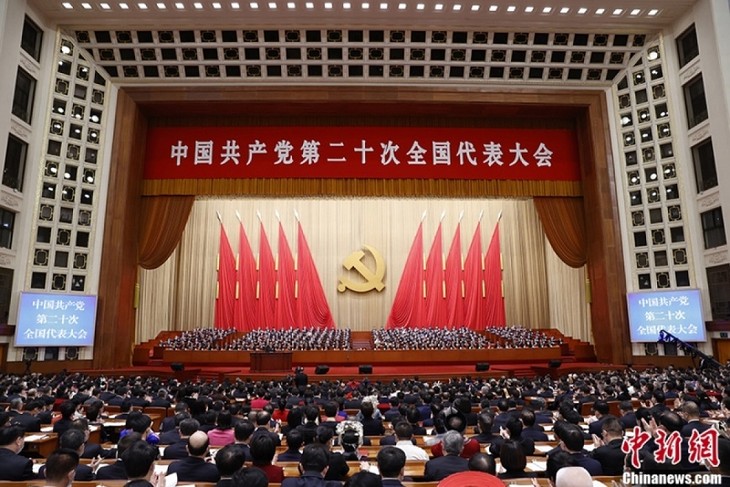 The 20th National Congress of the Communist Party of China begins on October 16, 2022 (photo: chinanews.com) The 20th National Congress of the Communist Party of China begins on October 16, 2022 (photo: chinanews.com) |
7. US midterm elections: Republicans take control of the House
The US midterm elections saw tough competition between the Democratic and Republican parties. The Democrats secured control of the Senate and Republicans won control of the House of Representatives.
The Republic Party’s control of the House may challenge President Joe Biden in the last 2 years of his term, affect the US’s internal and external policies, and have more or less impact on the presidential election in 2024.
 American voters cast their ballots at the mid-term elections. (photo: Getty Images) American voters cast their ballots at the mid-term elections. (photo: Getty Images) |
8. NATO continues to expand its alliance
30 members of the North Atlantic Treaty Organization (NATO) signed Admission Protocols for Sweden and Finland on July 5, 2022 in Brussels. It was the most important expansion of the alliance since the mid-1990s.
By joining NATO Sweden and Poland broke the neutral stance of Nordic countries and changed the European geopolitical landscape.
Once the two Nordic countries complete their accession to NATO, it will create major changes to the security structure in Europe in the future.
 Polish Foreign Minister Pekka Haavisto (L), NATO Secretary General Jens Stoltenberg (C) and Swedish Foreign Minister Ann Linde at a ceremony in Brussels on July 5, 2022. (photo: Reuters) Polish Foreign Minister Pekka Haavisto (L), NATO Secretary General Jens Stoltenberg (C) and Swedish Foreign Minister Ann Linde at a ceremony in Brussels on July 5, 2022. (photo: Reuters) |
9. DPRK conducts multiple missile tests, passes Nuclear Law declaring itself a nuclear weapons state
The Supreme People’s Council of the Democratic People’s Republic of Korea ratified the Nuclear Law on September 8, 2022, which would allow the country to conduct a preemptive nuclear strike.
The law references the use of nuclear weapons if a “fatal military attack against important strategic objects” is “judged to be on the horizon.” In 2022 the DPRK launched at least 52 ballistic missile tests and 6 cruise missiles.
The US, Japan, and the Republic of Korea increased large-scale exercises to counter nuclear and missile threats from the DPRK. The moves of the parties seriously threaten security and peace in Northeast Asia.
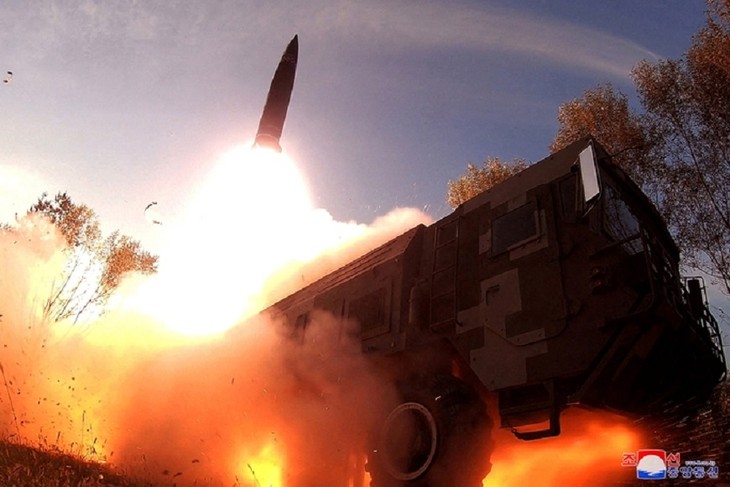 Image of a missile launch posted on KCNA on October 10, 2022. (photo: Reuters) Image of a missile launch posted on KCNA on October 10, 2022. (photo: Reuters) |
10. World Cup held in a Muslim Islamic for the 1st time
World Cup 2022 was held in Qatar from November 20 to December 18, 2022 with many special features. It was the first time a World Cup was held in a Muslim Middle East country and in winter instead of summer.
For the first time in the World Cup’s history, Morocco, an African team, entered the semi-finals. Argentina won over France to become the world’s football champion.
The 2022 World Cup honored football genius Lionel Messi and Kylian Mbappé as representatives of a new generation football talents.
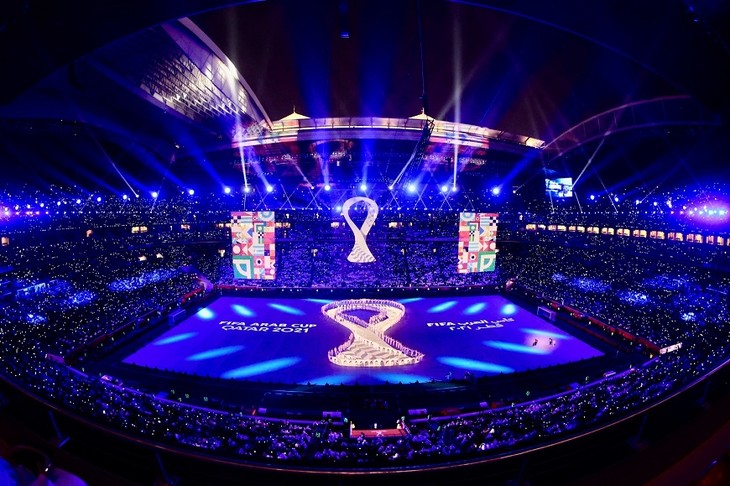 FIFA World Cup 2022 opening ceremony at the Al Bayt stadium (photo: goal) FIFA World Cup 2022 opening ceremony at the Al Bayt stadium (photo: goal) |